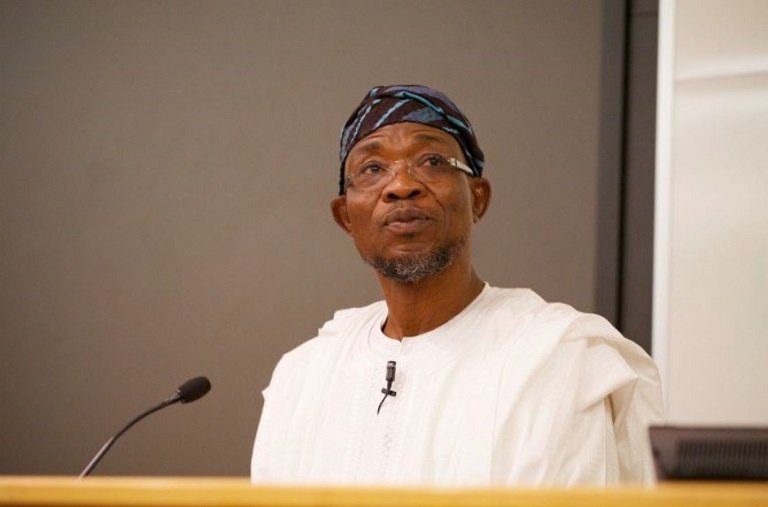Nigerian economists, along with business, policy and political leaders have advised the Federal Government to consider massive investment in girl education, increase the capacity of revenue collection agencies, formalise the informal sector and improve the production capacity of Nigerians in order to unlock mass prosperity.
These were some of the major takeaways from the Ogbeni Rauf Aregbesola Colloquium 2020, which held via Zoom on Saturday 30th May, with the theme “Government Unusual: Innovative Economic Solutions to Unlock Mass Prosperity.”
Some of the panelists included respected economist, Bismark Rewane; Chairman of Citibank Nigeria, Yemi Cardoso; Statistician General of the National Bureau of Statistics of Nigeria (NBS), Dr. Yemi Kale; the former Director-General of the Bureau of Public Service Reforms (BPSR), Dr. Joe Abah; the CEO Lotus Capital, Hajara Deola; Governor Nasir el-Rufai of Kaduna and Governor Abubakar Bagudu of Kebbi.
Mr. Rewane pointed out that Osun had Nigeria’s lowest multi-dimensional poverty index in 2016 and the 4th lowest poverty head count rate in 2019 at 8.5%, which is well below the national average of 40.09% according to the NBS. He also explained that the percentage of Osun secondary school students that passed WAEC grew from 13.98% in 2010 to 39.41% in 2018, even briefly peaking at 45.47% in 2016.
“The GDP for Osun state actually grew from N986 billion in 2013 to N1.47 trillion in 2017 which is 47% increase for this period,” he said. “When you take the average for the eight years, it was 6.12%. at that point in time, Nigeria’s growth rate was lower than that.
“Osun has the lowest unemployment rate in the country at 10.1%. Unemployment and Underemployment of 24.7% and a Misery Index (Inflation + Unemployment + Underemployment) of 36.8% where the National Misery Index is far above 50%.”
Mr. Rewane ended his presentation by saying, “In terms of leadership, social contract, (and) connecting with the people, one can say that this (Aregbesola) is a leader that should be emulated. History will be the judge.”
Dr. Kale said the key to mass prosperity is reducing unemployment and formalising the informal sector to ensure that incomes are more steady. He said, like Osun did under Aregbesola, states must improve education, particularly girl education, and create more jobs. He also pushed for the use of data in budget planning, adding that formalising the informal sector leads to wealth creation.
“Three solutions are proposed to address poverty from the state level: Address unemployment, increase formalization of the informal sector and design appropriate tax systems to extract revenue from economic activities,” he said.
Dr. Abah spoke about financing sustainable development, why nations succeed, reducing the cost of governance and the link between good governance and development.
“My hypothesis is the difference between rich and poor countries is Productive Capacity. The more you produce, the more wealthy you are,” he said.
He said that there is a need to raise productive capacity by raising GDP per capita and GDP per worker.
Speaking on role of the public sector in development, Dr. Abah said no nation has developed in the last 50 years without a strong civil service. He suggested that Nigeria should widen the tax net and invest in tax collection, develop greater capacity for public private partnership and reduce the cost of governance and cut waste.
He added that each state must focus on its competitive advantage and raise productive capacity and Nigeria must invest in the public sector and tie the investment to productivity.
Mrs. Ademola said that Sukuk can help in the construction of schools and to bridge the infrastructure gap. Speaking on ‘Pursuing Solutions that Deliver Prosperity,’ she mentioned that the Osun Sukuk was oversubscribed by 14%, the first FGN Sukuk by 5.8% and the second by 32%.
“Sukuk just represents about 1% of Nigeria’s debt stock, but given the performance we have seen in Sukuk both in Osun and the Federal Government across all six geopolitical zones, I think it is something that needs much larger allocation of our credit,” Mrs. Ademola said.
She added that government can attract liquidity by securitising, commercialising or privatising existing assets and deploying a policy where only made in Nigeria goods are used, for instance how Ogbeni Aregbesola used the power of government to produce school uniforms in mass and employed thousands of tailors.
Speaking about Ogbeni Aregbesola, Gov. el-Rufai said, “I have great admiration for Aregbesola What struck me the most about him is his passion and his concern m about the fate of the most vulnerable. The simplicity and the inclusive way he ran his government. He used the machinery of government to ensure that every young person was engaged.
He said Osun is one of the safest states in Nigeria with the lowest rate of crime and called Aregbesola “a socialist with a good heart.”
“He did many innovative things to create prosperity in Osun and the results are clear as shown by the Statistician General. By the time I got elected as governor, I sent a time to Osun to look at some of these policies to implement them in Kaduna. We copied Rauf!”
Responding, Ogbeni Aregbesola thanked the panellists and said his motivation had always been making the majority more comfortable.
“A mobilised people can never be in debt, regardless of the size of the debt. We did not use debt to fund any of our social programmes. The bulk of the debt that is overhanging now is overdraft of salaries. The loans we took from the capital market were direct at development; physical and human.”
He explained that the SEC loans were liquidated last year while the Sukuk bond would be liquidated by November of this year. He ended the event by thanking the President, Muhammadu Buhari, and National Leader of the All Progressives Congress, Asiwaju Bola Tinubu.











